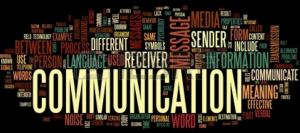Communication is key to succeed.
“The secret of success is the consistency to pursue.” Harry F. Banks
I have one golden rule for having good communication and it is this.
“Your ability to communicate is directly proportional to the quality of your life.” Just let that statement sink into your consciousness. Generally people believe that they communicate effectively if this is true then ask yourself “ Why there appears so much confusion in your daily life.”
Improving Communication Skills in Your Work and Personal Relationships sounds so simple: Say what you mean. But all too often, what we try to communicate gets lost in translation despite our best intentions. We say one thing, the other person hears something else, and misunderstandings, frustration, and conflicts ensue.
Fortunately, you can learn how to communicate more clearly and effectively. Whether you’re trying to improve communication with your spouse, kids, boss, or coworkers, you can improve the communication skills that enable you to effectively connect with others, build trust and respect, and feel heard and understood.
What is effective communication?
Communication is about more than just exchanging information. It’s about understanding the emotion and intentions behind the information.
Effective communication is also a two-way street. It’s not only how you convey a message so that it is received and understood by someone in exactly the way you intended. It’s also how you listen to gain the full meaning of what’s being said and to make the other person feel heard and understood.
More than just the words you use, effective communication combines a set of skills including nonverbal communication, engaged listening, managing stress in the moment, the ability to communicate assertively, and the capacity to recognize and understand your own emotions and those of the person you’re communicating with.
Effective communication is the glue that helps you deepen your connections to others and improve teamwork, decision-making, and problem solving. It enables you to communicate even negative or difficult messages without creating conflict or destroying trust.
While effective communication is a learned skill, it is more effective when it’s spontaneous rather than formulaic. A speech that is read, for example, rarely has the same impact as a speech that’s delivered (or appears to be delivered) spontaneously. Of course, it takes time and effort to develop these skills and become an effective communicator. The more effort and practice you put in, the more instinctive and spontaneous your communication skills will become.
To effectively communicate, we must realize that we are all different in the way we perceive the world and use this understanding as a guide to our communication with others. Tony Robbins
